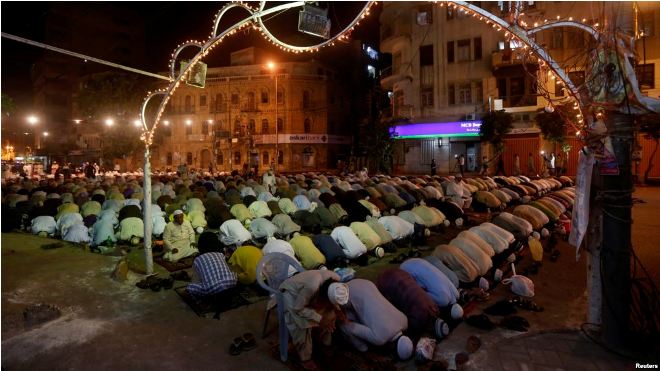Two influential Somali clerics reject violence as Ramadan begins


By: Ahmed Mohamed
Based on confirmed sightings of Ramadan’s new moon crescent, millions of Muslims around the world are fasting on the first day of the holy month. According to Islam, the sighting of the new moon marks the beginning of the Muslim lunar month of Ramadan.
Thirty-three countries, mainly those in which the majority of residents are Sunni Muslims, officially started Ramadan on Saturday. Bangladesh, Pakistan, India and Shi’ite Muslims in Iraq declared Sunday to be their first day of Ramadan.
During Ramadan, which is the holiest and the ninth month of the Islamic lunar calendar, Muslims abstain from food, drink, sex and immoral acts from sunrise to sunset. It is one of the most important Muslim practices — the Five Pillars of Islam — and just the second below the shahada, which is the sincere recitation of the Muslim profession of faith.
In Ramadan, fasting and carrying out the other Islamic obligations provide the framework of a Muslim’s life.
But in contrast with these Islamic values, the Islamic State and other terrorist groups in the world, like al-Shabab in Somalia, use the holy month to call for more violence against the West and other Muslim counties by attacking innocents and civilians.
An Afghan man reads the Quran at a mosque on the first day of the holy month of Ramadan in Kabul, Afghanistan, May 27, 2017.
This year, Ramadan begins as the world mourns the loss of innocent victims of barbaric terrorist attacks in the United Kingdom and Egypt.
Messages from clerics
Moderate Muslim clerics across the world started Ramadan with messages to the world emphasizing that acts of terrorism and violence are directly contrary to the spirit of Ramadan.
“Ramadan is a month of peace, love and respect for all, but not a month of violence and bloodshed. Those calling for mayhem do not represent Islam and Muslims,” said Sheikh Bashir Ahmed Salad, an influential cleric and the chairman of the Council of Religious Scholars of Somalia.
In Britain, Muslim leaders called for calm and special prayers for the victims of the Manchester bombing.
Muslims in America are observing Ramadan this year for the first time under President Donald Trump. In a statement on Ramadan, Trump focused on violence and terrorism.
“At its core, the spirit of Ramadan strengthens awareness of our shared obligation to reject violence, to pursue peace, and to give to those in need who are suffering from poverty or conflict,” Trump’s statement said.
Imam Sharif Mohamed of Islamic Civic Society of America at Dar Al-Hijrah Mosque in Minneapolis said the president’s message was different from the Ramadan massages of former Presidents Barack Obama and George W. Bush.
“Unlike Obama and George Bush, Trump mainly focused on the fight against terrorism in his Ramadan statement,” said Sharif. “His statement only represented his election campaign and the anti-Muslim rhetoric he was notorious with.”
Taking Heart
In Minnesota, the Muslim American Society and Minnesota Council of Churches continue a program called Taking Heart to bring Christians and members of other faith communities together with Muslims for food and conversation.
“For many years, Minnesota mosques and Islamic Community Centers and mosques like ours, we have been running such programs where we sit with non-Muslim neighbors for a traditional Ramadan iftar, inviting a time of learning and encounter,” Sharif said.
“Our faith, Islamic faith, obliges us to follow the message of tolerance, co-existence, and to publicly condemn violence, extremism, any form of that,” he said.
Growing in popularity, Taking Heart saw more than 800 non-Muslims attend open-house iftar dinners in 2016.
VOA